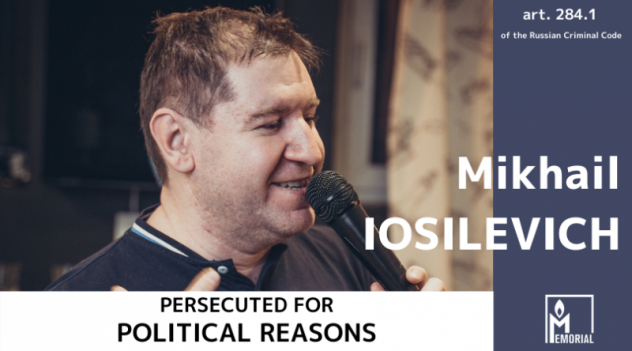The prosecution of Nizhny Novgorod opposition activist Mikhail Iosilevich for involvement with an ‘undesirable organisation’ is politically motivated and unlawful
Mikhail Iosilevich is being prosecuted solely because opposition events were held on a property owned by him. The journalist Irina Slavina, who was driven to suicide, was a witness in the case
Memorial Human Rights Centre considers the prosecution of Nizhny Novgorod entrepreneur and activist Mikhail Iosilevich politically motivated. The prosecution is intended to force him to cease or change the nature of his public activities as a critic of the current authorities solely because of his political beliefs and his non-violent exercise of freedom of thought, freedom of expression and information, freedom of peaceful assembly and association, and other rights and freedoms guaranteed by the International Covenant on Civil and Political Rights and the European Convention on Human Rights and Fundamental Freedoms.
Iosilevich’s prosecution is part of a major campaign by the Russian authorities against critics of the government connected to Open Russia (an organisation associated with the figure of Mikhail Khodorkovsky) and against the political opposition in general. Memorial has already included Open Russia’s Rostov activist Anastasia Shevchenko in its list of political prisoners and Krasnodar opposition activist Yana Antonova in its list of victims of politically motivated prosecutions who have not been deprived of liberty.
Memorial demands an immediate end to the prosecution of Mikhail Iosilevich, the removal of the repressive and unlawful Article 284.1 from the Criminal Code (that penalises ‘carrying out the activities on the territory of the Russian Federation of a foreign or international non-governmental organization whose activities have been recognised as undesirable on the territory of the Russian Federation’) and the punishment of those guilty of driving the journalist Irina Slavina to suicide.
Who is Mikhail Iosilevich and what is he accused of?
Iosilevich is an entrepreneur and civil society activist from Nizhny Novgorod, a supporter of the Flying Pasta Monster Church and head of its Nizhny Novgorod community.
On 29 September 2020 a criminal investigation was begun against Iosilevich under Article 284.1 of the Criminal Code for carrying out the activities of an undesirable organization.
The text of the decision to initiate the investigation states that Iosilevich had already been fined twice under Article 20.33 of the Code of Administrative Offences (‘Carrying out the activities on the territory of the Russian Federation of a foreign or international non-governmental organization whose activities have been recognised as undesirable on the territory of the Russian Federation’) because in February 2019 he provided premises for the holding of the Free People Forum and in December 2019 for a lecture by the opposition politician Aleksandr Solovyov. Now, allegedly ‘in order to undermine the foundations of the constitutional order and security of the state,’ from 2 to 9 September 2020 Iosilevich provided premises for the training of local election observers. According to the investigators, the training sessions were organised in the framework of the ‘United Democrats’ project run by the Open Russia movement.
On 1 October searches were conducted of the apartments of a number of civil society activists and journalists in Nizhny Novgorod.
The next day, Nizhny Novgorod-based journalist Irina Slavina, who had already been subjected to a humiliating search and had previously been repeatedly fined on far-fetched grounds, committed an act of self-immolation in front of the headquarters of the Nizhny Novgorod region Interior Ministry building. In a post on her Facebook page before her suicide, she wrote: ‘Please blame the Russian Federation for my death.’
Why does Memorial consider the prosecution of Iosilevich politically motivated unlawful?
We consider Mikhail Iosilevich to be unlawfully prosecuted for political reasons because the very notion of ‘undesirable organisations,’ and the legislative norms that penalise carrying out their activities on the territory of the Russian Federation, imply arbitrary and inconsistent application and contradict the principle of legal certainty and other fundamental principles of law:
- Open Russia carries out non-violent, legal opposition and human rights activities that are normal in a democratic society, combining classical forms of NGO and media activities that make the very accusations of participation in them illegitimate.
- The prosecution of Iosilevich is connected to the fact that, as an entrepreneur engaged in opposition activities, he has a resource in the form of premises that he can rent out to civil society and political groups that the authorities do not like.
- In Iosilevich’s criminal case, there are clear signs of falsification of evidence: it is claimed that Open Russia is a British organisation although no objective evidence of this is presented and all known information confirms that Open Russia is a Russian civil society association.
- There is every reason to believe Iosilevich did not even participate in the activities of the ‘Russian’ Open Russia, something confirmed both by the nature of his public activities and by statements by representatives of this organisation. Moreover, representatives of the Golos movement, the regional branch of the Yabloko party and Aleksei Navalny’s local headquarters assert that the training sessions for election observers were organised by them, not by Open Russia or its projects.
More information about this case and the opinion of Memorial Human Rights Centre are set out on our website.
Recognition of an individual as a political prisoner or as a victim of politically motivated prosecution does not imply Memorial Human Rights Centre agrees with, or approves of, their views, statements, or actions.
How you can help
You can support all political prisoners by donating to the Fund to Support Political Prisoners of the Union of Solidarity with Political Prisoners via PayPal, using the e-wallet at [email protected].




